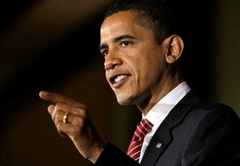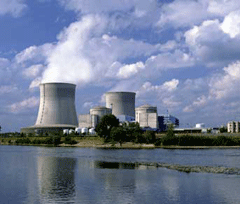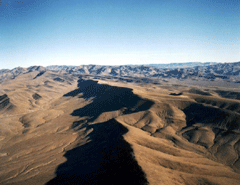Obama’s Nuclear Balancing Act
Air Date: Week of October 17, 2008

(Courtesy of Barack Obama)
Senator Obama told Iowa voters he's "not a proponent" of nuclear power." Then he pledged to "safely harness nuclear power." Just where does Barack Obama stand on nuclear power? Living on Earth’s Jeff Young finds out.
Transcript
CURWOOD: In the final presidential debate between Barack Obama and John McCain, the Republican nominee mentioned nuclear power six times, while the word “nuclear” never passed the lips of Senator Obama. So just where does the Democratic contender stand? Living on Earth's Washington correspondent Jeff Young reports.
YOUNG: Back in December, when Sen. Barack Obama was still the underdog in the
Democratic primary, he took a question on nuclear power at a campaign event in Iowa.
OBAMA: I start out with the premise that nuclear energy is not optimal. So I’m not a nuclear energy proponent.
YOUNG: Obama said he could not rule out nuclear power because it provides electricity without greenhouse gas emissions. But he pointed out the high costs, safety and waste problems.
OBAMA: Until we solve those problems and until the nuclear industry can show they can produce clean safe energy without enormous subsidies from the U.S. government, I don’t think that’s the best option.
YOUNG: That might leave the impression that Obama opposes nuclear power. But in a debate this month, Obama said that’s not so.
OBAMA: I favor nuclear power as one component of our overall energy mix.
YOUNG: So is Obama “not a proponent” of nuclear power or does he “favor nuclear power”? Well, both, explains Obama senior advisor on energy issues, Elgie Holstein.
HOLSTEIN: He absolutely supports the role that nuclear power plays in providing electricity to our economy. However, that does not turn his back on the very real problems, the high cost of nuclear power, the problems with permanently disposing of the waste. But these are solvable problems, and nuclear power can certainly continue to expand.

(Courtesy of the Department of Energy)
AURILIO: Senator Obama has said that he would keep nuclear on the table if you could address cost, safety and waste concerns. Our perspective is we oppose nuclear power unless you can solve the waste, safety and economic issues. So, Senator Obama is much closer to our position than Senator McCain is.
YOUNG: But over at the Nuclear Energy Institute, the industry’s lobbying group, they hear a different message from Obama. Here’s Alex Flint, the Institute’s senior vice president for government affairs.
FLINT: Senator Obama, looking at his objectives to meet climate change goals, recognizes nuclear is a necessary part of the answer. And then he sets a set of parameters that he wants to see. All those are things the industry is able to do. We think that means nuclear will be an important part of Senator Obama’s plans going forward.
YOUNG: Flint’s heartened to hear both major candidates support his industry. But there are some big differences. Senator McCain wants 45 new reactors by 2030. Obama avoids specific targets. And they differ sharply on how to deal with the waste. McCain wants to finish the Yucca Mountain site in Nevada for permanent storage of waste. And he wants to reprocess nuclear waste, as the French and Japanese do. Obama opposes reprocessing because that technology generates weapons-grade plutonium. And Obama opposes Yucca Mountain, as he told Nevada voters during a primary debate in January.

Yucca Mountain. (Photo courtesy of the Department of Energy)
YOUNG: But Flint, of the Nuclear Institute, thinks Obama’s position on Yucca has more to do with political science than sound science.
FLINT: I understand his concerns with Yucca Mountain. They principally are political, and I understand how a candidate for president, when going before Nevadans in advance of their caucuses would make commitments about Yucca Mountain. It’s an understandable phenomenon.
YOUNG: Obama campaign adviser Holstein says Flint is wrong about that.
HOLSTEIN: Senator Obama believes that the project has failed on the technical merits and also that it has failed to sustain the public trust and confidence, which is essential if you’re going to build a project of this scale.
YOUNG: Holstein says Obama favors dry casks for long-term storage until better waste disposal is found. That’s a system being used in Illinois, Obama’s home state. Illinois gets almost half its electricity from nuclear power – the highest rate in the country – and ten of the state’s 11 reactors are run by the Exelon corporation. John Rowe is Exelon’s CEO.
ROWE: Senator McCain is clearly more committed and more out front on nuclear. Senator Obama is probably more out front on efficiency. We think you’ve gotta have both. I like both candidates. I’m very careful.
YOUNG: He might like both, but Rowe is putting his money behind Obama. He and other Exelon employees gave $190,000 to the campaign. That’s despite an episode two years ago when Obama criticized Exelon for failing to notify the public about leaks of radioactive material. Obama wrote a bill to force disclosure of such leaks, but the bill failed in the face of industry lobbying. Greenpeace nuclear policy analyst Jim Riccio says it was probably an instructive experience.

(Courtesy of Barack Obama)
RICCIO: I think he probably learned a little political lesson when taking on the nuclear industry it’s a very powerful lobby. It has long arms.
YOUNG: A year earlier, Obama faced another big nuclear vote: the energy bill supported by President Bush included loan guarantees and other major incentives for the nuclear industry. That 2005 energy bill was the topic of one of the more memorable exchanges of this month’s presidential debates.
MCCAIN: And it was sponsored by Bush and Cheney. You know who voted for it? You might never know – that one. You know who voted against it? Me.
YOUNG: So the candidate who claims the strongest support for nuclear, McCain, criticizes his opponent for voting for a bill that supported nuclear power. It’s an odd twist. But as these candidates try to navigate new energy challenges and tricky political terrain, you can expect the unusual.
For Living on Earth, I’m Jeff Young in Washington.
[MUSIC: Broadway Project “I Partisan” from In Finite (ODS Records 2008)]
Links
Environment America assesses the candidates’ nuclear plans
Nevada’s agency for nuclear projects archives information on Yucca Mountain
Living on Earth wants to hear from you!
Living on Earth
62 Calef Highway, Suite 212
Lee, NH 03861
Telephone: 617-287-4121
E-mail: comments@loe.org
Newsletter [Click here]
Donate to Living on Earth!
Living on Earth is an independent media program and relies entirely on contributions from listeners and institutions supporting public service. Please donate now to preserve an independent environmental voice.
NewsletterLiving on Earth offers a weekly delivery of the show's rundown to your mailbox. Sign up for our newsletter today!
 Sailors For The Sea: Be the change you want to sea.
Sailors For The Sea: Be the change you want to sea.
 The Grantham Foundation for the Protection of the Environment: Committed to protecting and improving the health of the global environment.
The Grantham Foundation for the Protection of the Environment: Committed to protecting and improving the health of the global environment.
 Contribute to Living on Earth and receive, as our gift to you, an archival print of one of Mark Seth Lender's extraordinary wildlife photographs. Follow the link to see Mark's current collection of photographs.
Contribute to Living on Earth and receive, as our gift to you, an archival print of one of Mark Seth Lender's extraordinary wildlife photographs. Follow the link to see Mark's current collection of photographs.
 Buy a signed copy of Mark Seth Lender's book Smeagull the Seagull & support Living on Earth
Buy a signed copy of Mark Seth Lender's book Smeagull the Seagull & support Living on Earth

